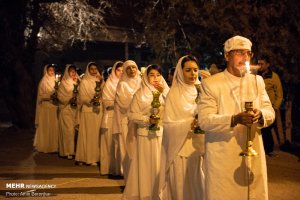A Revolutionary Court in Iran has sentenced six citizens of the Bahá’í faith to a total of 73 years and six months in prison merely for engaging in activities related to children’s education and training and for disseminating their religion on Facebook, which the government classifies as dissident and counter-revolutionary activity.

Borhan Esmaili was convicted of “propaganda activities against the regime by spreading the beliefs of the Bahá’í sect and acting against national security by disseminating and propagating the ideas of the Bahá’í sect.” The remaining five were convicted of “assisting in propaganda activities against the regime by spreading the beliefs of the Baha’i sect, producing and publishing vulgar images in social media, and acting against national security by publishing the Bahá’í sect’s ideas.”
The sentences were delivered in May by the Revolutionary Court of Dashtestan County, located in the capital city of Borazjan. The six Bahá’ís are Borhan Esmaili, Maryam Bashir, Faranak Sheikhi, Hayedeh Ram, Minoo Bashir and Derna Esmaili—residents of Borazjan and the holy city of Shiraz, the birthplace of the cofounder of the religion and a pilgrimage site for the Bahá’í.
The punishments were much harsher than those imposed on other Bahá’ís by another Revolutionary Court in Shiraz in May 2020. In that verdict, seven Bahá’ís were sentenced to a combined 33 years in prison. Both cases evoke memories of 20-year sentences handed down to each of seven other Bahá’ís in 2007 (later reduced to 10 years) on charges of “propaganda against the regime and membership in anti-regime groups.”
The six Bahá’ís most recently convicted will serve at least 10 years each in prison, in keeping with Article 134 of the Islamic Penal Code, which requires defendants to serve only the longest sentence in cases involving multiple convictions.
Iran’s theocratic regime has recently stepped up its repression of Bahá’ís. In May 2021, three members of the faith—Mahvash Adalati Aliabadi, Sepideh Keshavarz and Farid Esmaili, residents of Tehran, were recently sentenced to three years and seven months each in prison. The sentences were imposed by Branch 36 of the Tehran Court of Appeals, on charges of “acting against national security through managing the Bahá’í organization.”
The three individuals were each sentenced to four years and three months in prison by a lower court on January 10, 2021, on the same charges, plus “spreading propaganda against the system through promoting Bahá’ísm.”
Tehran considers the Bahá’ís to be heretics and deprives them of religious and other liberties, in violation of the 1948 Universal Declaration of Human Rights. Although Iran has a substantial number of Bahá’ís—unofficial estimates of the community’s population is more than 300,000—the only faiths the country’s constitution recognizes are Islam, Christianity, Judaism and Zoroastrianism.
“Iran considers its Bahá’ís to be heretics with no religion,” Iran Human Rights Watch said in a July 2019 report. “Rights groups say authorities routinely arrest members of Iran’s estimated 300,000-strong Bahá’í minority for expressing or practicing their beliefs.”
In its 2021 annual report, the United States Commission on International Religious Freedom, a bipartisan federal body that advises the U.S. State Department, listed Iran among 14 “countries of particular concern” for their “systematic, ongoing, and egregious” violations of religious freedom. Iran has been on the list consistently since 1999.
___________________
The Church of Scientology publishes this blog to help create a better understanding of the freedom of religion and belief and provide news on religious freedom and issues affecting this freedom around the world.
The Founder of the Scientology religion is L. Ron Hubbard and Mr. David Miscavige is the religion’s ecclesiastical leader.
For more information, visit the Scientology website or the Scientology TV network.


